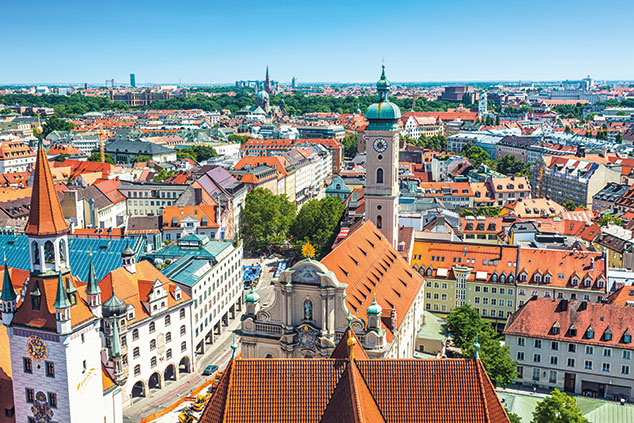
As the UK’s market slows, now could be a good time to look to the continent.
Last year German property prices had their strongest period of growth in at least three decades, says Fitch Ratings. That continued a run of house-price inflation that has seen prices in large metropolitan cities go up by 80% from 2009 to 2017, according to figures from Deutsche Bank. In Munich apartment prices have more than doubled, while in Hamburg they have risen by over 70%.
Several factors have driven this trend, including low interest rates, strong economic growth and unemployment levels being at a post-unification low, says Fitch. And while the population in Germany’s main cities has grown quickly, housing supply has failed to keep up.
For example, the population in Munich rose from 1.36 million to 1.53 million between 2009 and 2017, leaving a shortage of several tens of thousands of residential units, according to Deutsche Bank. Across the country as a whole there is a shortfall of roughly one million units.
Berlin transformed
Prices are rising especially fast in Berlin, which in March came top of a global ranking of 150 residential property markets compiled by estate agent Knight Frank, “sealing its transformation from a grungy backwater to one of Europe’s most sought-after locations”, says Andrew Blackman in Bloomberg. Asking prices in Berlin were up by more than 20% year-on-year. Three other cities – Hamburg, Munich and Frankfurt – also made it into the top ten, with increases of over 13%.
While property in major cities looks overvalued by past standards, the reality is that the uptrend is likely to continue for several more years, says Deutsche Bank – potentially eventually turning into an outright bubble. The factors most likely to bring it to an end include a huge rise in the number of new houses built; an abrupt drop in demand due to less immigration; a switch towards renting because purchase prices have got too high; and a sharp increase in interest rates.
There’s no sign that the first three shifts are imminent in any major cities, says Deutsche Bank. And while interest rates are likely to go up in the years ahead, increases should be gradual.
Making up for lost time
The risk of a correction will increase if prices continue to rise at the current rapid rate, says Fitch. However, affordability remains below its mid-1990s level, and is generally comparable with that of many other western European markets. It’s also important to put recent price rises in the context, say bulls. “For 20 years, we had no growth in Germany at all – nothing,” Michael Zahn, the chief executive of Deutsche Wohnen (Frankfurt: DWNI) told Bloomberg recently. “We’re now making up for lost ground, but that doesn’t mean the market has peaked”.
His firm is the second-largest listed residential landlord, with a portfolio of over 160,000 units across the country, worth €20.8bn, of which around 70% is in Berlin. It has been a takeover target for its larger rival Vonovia (Frankfurt: VNA), which manages a €38.5bn portfolio of over 350,000 units across the country.
Smaller, potentially faster-growing peers include Grand City Properties (Frankfurt: GYC), which specialises in buying turnaround properties and has built a €8.3bn portfolio. London-listed Phoenix Spree Deutschland (LSE: PSDL) is a smaller operation focused on Berlin, with a portfolio valued at €609.3m.